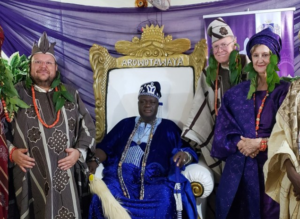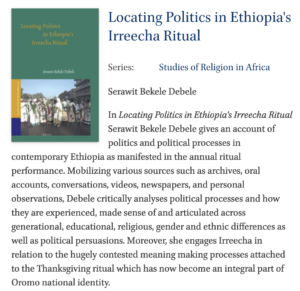2020
Interview with Laura Grillo!
We are pleased to share that Dr. Elisa Prosperetti chose AASR member Laura Grillo’s book, An Intimate Rebuke: Female Genital Power in Ritual and Politics in West Africa (Duke UP 2018), to feature in the Podcast New Books Network. A historian specializing in modern Africa with particular knowledge of Côte d’Ivoire, Elisa was a keen and informed interviewer. It will be sure to draw attention to the book’s timely theme: The postmenopausal ‘Mothers’ deploy their spiritual power to decry immoral leadership and demand justice, without which there can be no peace!
To listen to the interview, please go to:
https://newbooksnetwork.com/laura-s-grillo-an-intimate-rebuke-female-genital-power-in-ritual-and-politics-in-west-africa-duke-up-2018/
2020
Professor Rosalind I.J. Hackett Honoured
Professor Rosalind I.J. Hackett installed Honorary Chief of Erinmoland in Nigeria
By Elias Kifon Bongmba
Professor Hackett

Photo credits: Brent Belnap
The African Association for the Study of Religion congratulates Professor Rosalind I.J. Hackett, University of Tennessee Chancellor’s Professor and Distinguished Professor in the Humanities and Religious Studies, for receiving an Honorary Chieftaincy in Nigeria. The Honorary Chieftaincy was bestowed by His Royal Majesty Oba (Dr) Michael Odunayo Ajayi when he celebrated the fifth anniversary of his coronation as the Elerinmo of Erinmoland, on August 9-10, 2019. At the ceremony of investiture and the celebrations that followed, Hackett and other honorees received the insignia and formal wear befitting their chieftaincy status. She was granted the title of “Yeye Meye of Erinmoland” (Mother who knows our ways).
Hackett was honored for her research and the work she has done for the African Consortium for Law and Religion Studies (ACLARS) for nearly a decade. Hackett is a founding member of ACLARS and serves on its board, as well as playing an active role in planning the highly successful ACLARS conferences in Africa. These annual conferences have created a vibrant forum for African scholars of various disciplines to address critical contemporary issues at the intersection of law, human rights, and religion.
Hackett was pleasantly surprised by this honor and told her colleagues at the University of Tennessee: “It comes at a time in my career when I was taking stock of all the research, teaching, mentoring, and conference planning I have conducted in Africa and beyond over the years. It’s a delight to get this recognition.” Starting from her undergraduate student days in the United Kingdom, Hackett has maintained an abiding presence in Nigeria with more than nine years of research and teaching, making Nigeria her second home. Hackett has done research in more than twelve African countries, spending the most time in Nigeria, Uganda, South Africa, and Ghana. Hackett’s interdisciplinary research has focused on cutting edge issues on African and Indigenous Religions, New Religious Movements, Religion and Art, Conflict and Peace, Religion and Gender, and Religion and Human Rights. Drawing theoretical insights from anthropology, sociology, religious studies methodologies, Hackett has studied and published well-received books and essays on religion and the media, religion and sound, and the growing influence of Pentecostalism in Africa.
Many scholars of Africa and the majority world know Hackett as the person to turn as a mentor in scholarship and the many ways of understanding and interpreting the human condition. Hackett’s work in Northern Uganda built international collaborations that brought together artists and musicians through the Jazz for Justice project. Hackett has served on numerous committees and editorial boards of scholarly journals boards around the world. She is a Past President and Honorary Life Member of the International Association for the History of Religions (IAHR). She currently serves as Vice-President of the International Council for Philosophy and Human Sciences (CIPSH). As members of the African Association for the Study of Religions, we proudly say Hail to the Chief!

Professor Hackett with His Royal Majesty Oba (Dr) Michael Odunayo Ajayi and other honorees, Professor W. Cole Durham Jr. of Brigham Young University and Professor Mark Hill, Queen’s Counsel, of Cardiff University in Wales.
Photo Credits Brent Belnap
Credit: Additional information from Brian Canever, and Addie Morton of the University of Tennessee. https://news.utk.edu/2019/09/16/hackett-receives-honorary-chieftaincy-in-nigeria/
2019
Call for Anthology Contributions: ‘Reimagining the African Academy’
LETS DIALOGUE: REIMAGINING THE AFRICAN ACADEMY:
TOWARDS A HUMANITIES-SCIENCE NEXUS
Edited by:
Dr Damaris Parsitau (Egerton University)
Professor Njoki Wane (University of Toronto)
Professor Anne Kubai (University of Uppsala)
Ms Hellen Taabu (University of Toronto)
Dr Evelyn Kipkosgei
Project Description
Africa’s higher education and research is currently undergoing tremendous shifts and challenges. The relationship between the Social Sciences and Humanities and STEM disciplines continue to draw serious debates and discourses about their roles in Africa’s development. In the recent past for example, there have been provocative debates and discourses about the role of the Social Sciences and Humanities (SSHs) not just in the academy but also in Africa’s development. Such debates assert that higher education in Africa would serve the needs of a rapidly growing continent better were universities to provide more Scientists, Mathematicians, Engineers, Physicists, Doctors, Agriculturalists and many other Science Technology, Engineering and Mathematics (STEM) allied disciplines. It is further argued that the STEM disciplines would help transform the African continent from a poor one to a more developed one. For these reasons, studies in history, languages, literature, culture, religion, philosophy, anthropology, sociology, gender and women studies, the arts and other humanities subjects have not only been deprioritized but have also been ridiculed by politicians, policy makers and even some university officials who have looked down on the humanities broadly conceptualized.
In Kenya for example, the debates have been spearheaded by senior government officials who have publicly mocked history and argued that ‘the country could not develop as a nation when we continue to teach the history of Vasco da Gama in Universities’. Such disdain for the social sciences and humanities by senior government officials goes a long way to show a complete lack of appreciation for the role of the humanities and social sciences in Africa’s development. It is such mockery and disdain for the humanities that informs not just policy but also how the humanities are perceived in Africa’s higher education. For these and many other reasons, the Social Science and Humanities disciplines appear at the bottom of any list of national goals and development. This deprioritization and marginalization of the SSHs have seen many departments in many public universities merged for ‘rationalization’ purposes, a measure that not only affects faculty teaching in these departments but also takes a way focus on specific disciplines.
In many Kenyan Universities for example, the so called ‘hard’ or Natural Sciences’ receive more attention than the Social Sciences and Humanities (SSHs). Agriculture, Engineering, Science and Technology, Mathematics, Computer Science and other allied disciplines receive greater attention from university management including higher budgets than the Social Sciences and Humanities disciplines. The privileging of one set of disciplines over the other is not helpful and is problematic in many ways. We urge for pragmatic conversations and dialogue between the two broad areas of disciplinary divides as well as their cooperation and mutual engagement. This sad situation needs to be remedied because no knowledge-led development strategy can succeed without a solid core of human values that are etched in the humanities and social sciences.
There is also need to bridge the gap between SSH and STEM as well as develop partnerships and engage and generate conversations between the two disciplinary divides so as to contribute to the emergence of broad-based skills required for African development. Mutual engagement between STEM and SSHs would also contribute immensely not just to the bridging of disciplinary divides but also provide holistic strategies through which universities would contribute to the emergence of broad based skills and all rounded graduates who would drive Africa’s development in the 21st Century. There is also a huge disconnect between the role of Social Science research in informing evidence based policy that would be impactful to communities and countries. Yet humanities and social sciences are best placed to inform about trends and shifts in society in a bid not just to inform and impact public policy but also bring in the kind of data that shapes public discourse and leads to social transformation.
At the same time, African countries are currently facing tremendous social, cultural, economic, political, digital and even leadership tensions and complexities that can only be understood and explained by the social sciences and humanities. The shear leadership crisis facing so many African countries today has caused untold sufferings to citizens particularly the most vulnerable populations, such as women, children, the old and Persons with Disabilities
The continued undermining, deprioritization, and marginalization of the Social Sciences and Humanities (SSH) as opposed to natural sciences in the African academy should be interrogated in view of the prevailing leadership crisis as well as the crisis facing the academy in Africa today. There is also critical need to increase contemporary intellectual discourse on the viability and sustainability of the SSH in the African leadership and academy.
Also, there is need to determine the roles that SSHs could play in the African socio-economic and political arena such as the enhancement of order and stability and paving a way forward for humanity. Therefore, as the devaluing and deprioritization of SSH in many universities in Africa persists and as conversations of “science policy” continue to focus on STEM backgrounds, the value of what SSHs bring to the policy making process needs further exploration. Further, the Nairobi Report of 2009 states that the humanities and social sciences are critical for development: “the perspective and knowledge which they offer on history, culture, social interactions, political systems, economics, and much more are vital to development and wellbeing … it is only by engaging with history and its expressions through literature and performance that communities and nations are able to understand and reflect on their origins, to understand their past and define their place in the world” (Nairobi Report, 2009:6).
It can be argued that it is foolhardy for policy makers to prioritize STEM over SSH since SSH blends that which is molded, invented or developed by the technologists to make it humane, friendly and valuable for human consumption. There is a consensus that a development that is not in tune with human needs, feelings, culture and tastes has no value. There is therefore a need for integrated development that is people centered and that has a human face.
Further, there is need to critically assess the instrumental role of SSHs in promoting a holistic development that encompasses the welfare of the people in all realms of their lives. At the same time, we think that poorly informed policy decisions can have significant and lasting ramifications for citizens. Ill-informed critics often assume that negative policy decisions can be averted if decision makers are guided by data and scientific evidence. However, this can be contested since most issues and decisions are influenced by cultural and political considerations that correspond to the beliefs, principles, and values of a people. We therefore argue that without the proper context and understanding, decisions that are based purely on data and scientific evidence can be incomplete, unpopular or lead to unintended consequences.
This call for papers allows us to interrogate these and many other themes on the nexus and intersections between the natural sciences and SSH as well as the role of education in contemporary Africa’s development. We attempt to ask a number of questions in respect of the role of education in Africa: Is it purely to create employment or should it also be mandated to mold well rounded citizens equipped with skills to work, crucial knowledge for navigating life embedded with values that are instrumental for the sustenance of society? With advancement in technology, it is critical to investigate the role of SSHs in understanding its impact on human and social interaction.
This anthology therefore needs minimal justification and calls on all stakeholders and policy makers to seek informed ways of responding to complex and multifaceted challenges that incorporate perspectives of individuals from a variety of backgrounds including SSHs and STEM. To deal with pressing policy challenges in contemporary Africa, we need critical voices and new ideas from across various disciplines to try and unpack the following questions: What is the future of the Social Sciences and Humanities (SSHs) in the Academy and Africa’s Leadership and Development? How do we envision the role of the Social Sciences and Humanities in the future of Africa even as the debate rages on, on the superiority of Science, Technology, Engineering and Mathematics (STEM) over SSHs in Africa’s future development and prosperity? Can there be a fine balance/co-existence between STEM and SSH in such a way that we envision Science that is Creative and the SSH that are Scientific? Is it possible to re-imagine a world where both the SSH and Natural Sciences are deemed as vital in the development of a healthy, vibrant economy and society?
Using the recent provocative debates and discourses that undermine the role of SSHs and privilege STEM, this call for chapters for the anthology: Let’s Dialogue: Reimagining The African Academy: Towards A Humanities-Science Nexus is an entry point that will enable us to get new insights and facilitate critical discussions. The Anthology hopes the contributors will address one or more of the following questions in their chapters:
• Is there a crisis of humanities or is it that humanity is in crisis?
• What is ailing the African academy?
• How can we design interdisciplinary courses within existing departments in the SSHs and
the STEM?
• How can we provide new and innovative tools and perspective for thinking about SSH
research in Africa?
• How can the humanities make use of digital media platforms to transform and enhance
research and teaching SSHs in African universities?
• How can we bridge the gender divide in the SSHs and STEM? This is important given the
fact that there exists glaring gender divides in higher education and research in
African universities.
• How does SSH fit into the relationship between the science and policy communities?
• What are the strengths that researchers from SSH have in influencing policy? What are the
weaknesses?
• How can policy-making processes be efficient and responsive while considering multiple
perspectives?
• What is the development nexus between the humanities and natural sciences?
Please see below for the deadlines for submission of your work to:
dparsitau@egerton.ac.ke
hellen.taabu@mail.utoronto.ca
The tentative deadlines are:
i) Circulation of call for papers: Sept & October
ii) Abstract submission for chapters – October 30th, 2019.
iii) Submission of chapters: Jan 30, 2019.
iv) Feedback to contributors: – Mar 28, 2020.
v) Chapters from contributors: April 30, 2020.
vi) Submission to CODESRIA: May 30, 2020.
vii) Feedback from CODESRIA – July 30th, 2020.
viii) Submission of final papers from contributors to CODESRIA: November 30th 2020.
ix) Publication of Manuscript: December 30th 2020
2019
New Publication by AASR Member!
Congratulations to AASR member Serawit Bekele Debele (BIGSAS/Bayreuth University) on the recent publication of her book, Locating Politics in Ethiopia’s Ireecha Ritual (Brill 2019, Studies of Religion in Africa series)! Check out the abstract below; or, for a more detailed overview and purchasing options, head over to the book’s page on Brill’s website!

2019
2019 ASRSA Conference in Pretoria: Registration and Details!
AASR colleagues, kindly note the following announcement and conference registration details from the Association for the Study of Religion in South Africa:
Dear Colleagues,
We trust this email finds you well.
The 2019 ASRSA conference in Pretoria is approaching and we are looking forward to meeting you there. Please find the registration form and some useful information here.
If you have any questions, please do not hesitate to contact us.
Kind regards,
ASRSA Executive Committee
